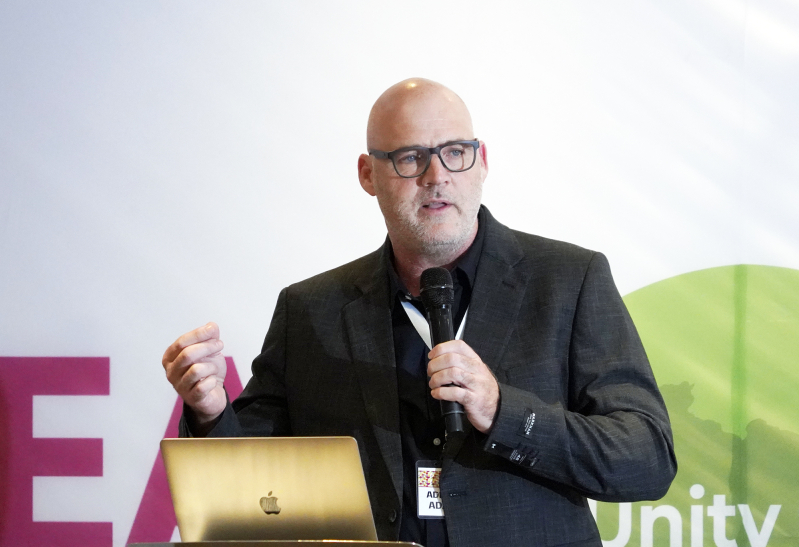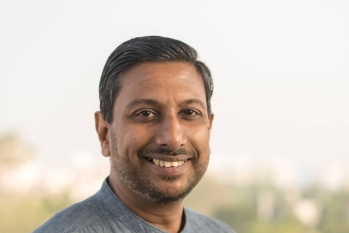
The use of Artificial Intelligence technology in church ministry can have immense potential in enhancing evangelism, fast-track and deepen theological education and supercharge church administration, but “it is not the Holy Spirit,” Adriaan Adams, the Executive Director of Focus Team Leadership Training told church leaders during the 13th Africa Evangelical Association (AEA) General Assembly in Nairobi on May 21, 2025.
Adams highlighted the rapidly changing landscape across Africa, marked by urbanization, demographic shifts, increased connectivity, and complex challenges. He posed a critical question for the church in Africa: How do we respond faithfully and effectively as technology and innovation reshape our world?”
His question stemmed from observing that many grassroots leaders face significant gaps in accessing “relevant, robust, and contextualized theological education and resources.” He emphasized that innovation and technology should serve the church's timeless mission, not distract from it.
Adams focused on making theological knowledge more accessible for grassroots leaders using these tools. Noting the inherent strengths of African churches - immense resilience, deep faith and strong community ties - Adams suggested innovation is about leveraging these while finding “new effective ways to equip our leaders, strengthen our communities, and share the gospel faithfully.”
As part of his PhD research, Adams narrated how he used AI to engage with grassroots church leaders in Southeast Africa to handle the anticipated "sheer volume of data" from interviews and focus groups. AI-powered tools were used to transcribe recorded conversations. Adams stated, "instead of typing every word that was spoken word by word, we used AI to do that for us. That took away a lot of time". This process significantly increased efficiency, allowing tasks that "used to take days could be done in minutes".
The AI platforms also helped Adams and his research colleague to analyze the data by identifying "recurring themes, key phrases or patterns across multiple conversations," providing a "map of the data highlighting potential areas of focus".
"When we sat and we had the conversation in the morning... We fed all that information into [the AI platform] and we could come up with four key themes that we could discuss around the crisis within their own local context," explained Adams who has been researching conflict response.
A separate AI translation tool offered quick understanding of phrases in local languages, assisting the team to "get context of what the conversation was all about" while working with translators.
Adams stressed that while AI enhanced efficiency, "It did not replace the actual listening, the personal connection that was made... or our own critical thinking and contextual understanding to interpret what was shared."
He emphasized the absolute necessity of human oversight, calling AI a "co-pilot" while the human remains the "pilot guiding and correcting." "AI make mistakes," he cautioned, noting that analyses were sometimes shallow and translations required verification.
Expanding AI applications in ministry
Beyond the research field, Adams further explored how AI and technology could more broadly serve the Church. He mentioned the World Evangelical Alliance (WEA) Bot that can use AI to process vast amounts of information generated at large global gatherings.
By feeding session responses, speaker notes, and recordings into an AI system, the goal is to "quickly disseminate crucial findings, insights, decisions, and themes to global leaders," enabling faster decision-making and knowledge sharing, potentially even during the event itself. This allows leadership "to better understand various inputs and gain understanding to better serve the network".
AI could also be useful in creating contextualized training programs, and monitoring and analyzing mega church membership engagement. This generates reports for discussions, helping the church be "more effective and precise in our application" by strengthening operations while keeping the focus on "relationship and spiritual growth."
Adams' research specifically applies AI to make complex theological concepts accessible. He described training an AI bot with credible Bible commentaries and resources to analyze scripture, providing context, translations, original text understanding, and implications for different audiences.
He clarified, "Now, let me say this quickly, this is not the Holy Spirit. It's a tool". He explained it helps gather extensive information quickly that would manually take hours, aiding deeper scriptural understanding.
Adams outlined practical uses of AI and digital technology in ministry areas including evangelism where tools like Facebook, WhatsApp, and social groups for sharing messages, inviting online discussions, and basic follow-up like managing contacts with WhatsApp Business.
Monitoring online conversations can provide insights into community needs. However, Adams issued a strong caution: "Technology in evangelism must always be a tool that leads to genuine human connection, relationship and discipleship. It's a doorway. It is not the destination."
Custom-trained AI bot for Scripture analysis serves as a model for making complex theology understandable and relevant, explained Adams, who further said that online libraries and free digital resources are now more accessible.
Adams stated that better administration using technology "reduces burnout, increases efficiency, and allows leaders and volunteers to spend more time with people and improve actual ministry work." While acknowledging it might seem "less spiritual," he asserted that "effective administration is essential for effective ministry."
Opportunities, challenges, and guardrails
Looking ahead, Adams outlined opportunities for African leaders in developing contextually relevant digital ministry, increased reach, empowering leaders, and building resilient ministry structures.
However, significant challenges persist, including access to "reliable electricity, constant internet connectivity and affordable devices." Digital literacy varies, requiring "intentional investment in training and support." Ethical questions around data privacy, AI biases, and "maintain[ing] authenticity" must be addressed, said Adams.
Crucially, there is the challenge of ensuring technology "enhances and does not erode the relational foundation of African Christianity, the face-to-face community, the personal care, and the shared life."
Adams offered five guidelines for thoughtfully applying technology: Ask if the technology truly serves the mission before adopting it, try a tool for a specific need, learn from mistakes, and adapt, focus on training leaders and members, as technology is merely the tool, share learnings and mistakes with others to learn collectively and let faith and scripture guide the use of technology.
In conclusion, Adams reiterated that technology and AI are "tools," provided by God that we be "wise stewards of." They must "serve the mission, they must enhance the relationships, and they need to help us to become better stewards of the resources."
He urged leaders to constantly ask: "How does this tool help me to fulfill the Great Commission and the Great Commandment, more faithfully and effectively in my context?"
Engaging with technology in ministry requires prayer, wisdom, and a focus on serving God and His people, Adams said.






